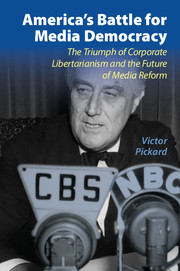 America's Battle for Media Democracy
America's Battle for Media Democracy Book contents
- Frontmatter
- Contents
- Acknowledgments
- Introduction
- 1 The Revolt against Radio
- 2 A Progressive Turn at the FCC
- 3 The Battle of the Blue Book
- 4 The Origins of the Fairness Doctrine
- 5 The 1940s Newspaper Crisis and the Birth of the Hutchins Commission
- 6 Should the Giants Be Slain or Persuaded to Be Good?
- 7 The Postwar Settlement for American Media
- Conclusion
- Bibliography of Primary Sources
- Index
- References
6 - Should the Giants Be Slain or Persuaded to Be Good?
Published online by Cambridge University Press: 05 October 2014
- Frontmatter
- Contents
- Acknowledgments
- Introduction
- 1 The Revolt against Radio
- 2 A Progressive Turn at the FCC
- 3 The Battle of the Blue Book
- 4 The Origins of the Fairness Doctrine
- 5 The 1940s Newspaper Crisis and the Birth of the Hutchins Commission
- 6 Should the Giants Be Slain or Persuaded to Be Good?
- 7 The Postwar Settlement for American Media
- Conclusion
- Bibliography of Primary Sources
- Index
- References
Summary
The American Society of Newspaper Editors’ (ASNE’s) annual conventions were typically grand affairs. Political elites made dramatic appearances and gave what were later hailed as significant speeches. Editors from top newspapers attended, as did prominent commentators and reporters. At the opening of the 1947 ASNE meeting, however, all did not seem well with American newspapers. In his farewell speech, the outgoing ASNE president and New York Herald Tribune editor Wilbur Forrest warned the incoming ASNE administration and general membership of a pair of looming threats. Forrest identified the first threat as “the control over the publication of news now exercised by labor union chieftains,” whose “manipulation of newsprint supplies and costs” amounted to “a violation of press freedom.” These “little dictators” held “power unprecedented in our history,” he warned. Labor unions “may shut down one or all of the newspapers in any given community literally overnight.... Vigilance must be constant.”
Forrest identified the second threat as government regulation. Decrying “government censorship,” Forrest claimed knowledge of a campaign aiming to “tear down the prestige of the American press as an institution in order to obtain government regulation of the press.” He asked, “Is not regulation a step in the direction of control?” Recommending a more aggressive defense of laissez-faire principles, Forrest cautioned, “We are ... in an era in which the American press is and will be under attack by those who constantly seek some measure of regulation.” Forrest called for ASNE to create a “small but active committee” to promote its own definition of “freedom of the press” to combat the “decided misconception” put forth by their critics. Otherwise, invocation of press freedom might give “some commissar a round-about hand on deciding what is proper or improper,” thereby justifying a “legislative step” toward regulation. He noted that the “twenty-five or thirty authors who have elected in recent years to needle the press” ignored that the reader is the final judge of press performance by giving “a publisher or an editor the jitters if enough of his kind write in and say they are in complete disagreement with the paper.” Forrest dismissed the charge that advertisers control newspaper coverage as “just so much outmoded claptrap.”
- Type
- Chapter
- Information
- America's Battle for Media DemocracyThe Triumph of Corporate Libertarianism and the Future of Media Reform, pp. 152 - 189Publisher: Cambridge University PressPrint publication year: 2014
